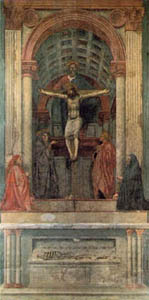Who says the Archdiocesen newspaper doesn't have anything good in it?
Thanks for the head's up to the guys over at the Seventh Age blog, there was a great commentary in there on Friday from Dr. Christopher Thompson, one of our amazing University of St. Thomas Catholic Studies professors (Chair of the Department actually) on the meaning of the Holy Eucharist!
The article can be found on the Catholic Spirit's webpage at The Catholic Spirit - Letters to the Editor (about half-way down the page), but I have posted the full write-up below because the Catholic Spirit is notorious for removing website content (or relocating it "site" unseen...) and I don't want to lose this one!!
(Also, on the web page, keep reading below Dr. Thompson's column for an amazing pro-life witness testimony! Lots of good stuff in the Catholic Spirit this week I guess...)
Eucharist — personal and cosmic
By Christopher Thompson
The Holy Father has declared this year a Year of the Eucharist and has asked us to give deeper consideration of this gift and mystery in our lives. It is an invitation well worth accepting.
For many of us, the celebration of the Eucharist typically occupies our Sunday mornings and marks the beginning of our week as members of the living body of Christ. It orders our spiritual lives and provides the necessary means of communion and common worship among the people of God.
The Eucharist has both personal and universal dimensions. Beyond the present moment and present community, the Eucharist is a drama of “galactic” significance. It is a proclamation about all times and places, all gatherings and people.
In the Eucharst, the “divine strategy” for all of history is perfectly disclosed, and our personal role as living members of that plan is affirmed: We are to become living members of his body, to become one spirit in Christ, to become an everlasting gift to the Father.
The “galactic” significance of the Eucharist is affirmed in the various prayers of the Mass itself. The priest proclaims before God that, “From age to age you gather a people to yourself so that from east to west a perfect offering may be made to the glory of your name.”
In all periods of history, humans seek to restore the relationship between themselves and God. Every human heart has a desire for fulfillment and completion, for a relationship of meaning and significance, a spark of eternal longing to be reconciled with the creator. The Eucharist is the summit of man’s historical search for God; it proclaims the central mystery of that loving relationship: Jesus Christ.
Instituted by Christ, the most perfect gift of God, the Eucharist is the extension throughout history of that same gift.
There is, therefore, a kind of divine strategy to all of this: the desire for God, the coming of Christ, our eucharistic celebration, the church. It is a strategy to conquer the world through love, to redeem the world through the actions of Christ, “at whose command we celebrate this Eucharist.” As living members of his body, we now extend his presence throughout history and culture. Our actions become his deeds in the world. Our love becomes his presence.
Making a sacrifice to the divinity marks so many moments in the history of religious practice. In the eucharistic prayer, we recognize that the actions performed today are but one enactment of the larger drama of man’s continual attempt to get things right with God. “Look with favor on these offerings and accept them as once you accepted the gifts of your servant Abel, the sacrifice of Abraham, our father in faith and the bread and wine offered by your priest Melchisedech.”
Yet the Eucharist is more than simply one more version of sacrifice. At Mass, the priest says, “As he offered his body on the cross, his perfect sacrifice fulfilled all others. As he gave himself into your hands for our salvation, he showed himself to be the priest, the altar and the lamb of sacrifice.”
In the Eucharist, the perfect sacrifice is made, the most complete thanksgiving is offered to the Father. While all of history is characterized by God’s grace and man’s response, the Eucharist is the fullest expression of that relationship of love.
But it is not merely on the historic scale that the Eucharist makes its mark. Unlike a historic event that is simply recalled and remembered, the Eucharist provides the occasion to enter person-ally into the dramatic significance of it all. As a living member of the body of Christ, as one who dwells in his Spirit given in baptism, I am intimately drawn into the drama of grace and redemption. I become a living member of this sacrifice of praise.
Living in his Spirit, baptized into his very life, you and I, together with him, now offer our own lives in our common sacrifice of praise. While Christ remains the eternal high priest and victim, we nonetheless share in his life — allowing us, then, to become united personally in his sacrifice. Together, with Christ, we are reconciled with God, and, as the priest says every week, are made “ready to greet him when he comes again.”
Christopher Thompson chairs the Catholic studies department at the University of St. Thomas in St. Paul.










0 Comments:
Post a Comment
<< Home